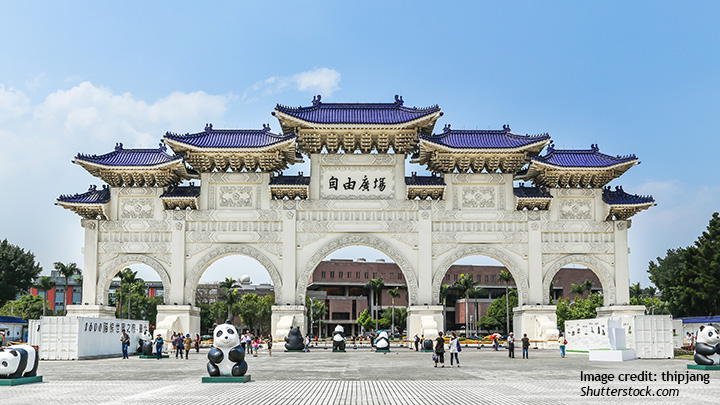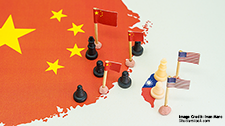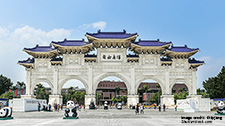Taiwan and International Organizations – Between Security, Cooperation and Identity

Agust Börjesson and Yi-Chieh Chen
International organizations are a historical point of contestation between the People’s Republic of China (PRC) and the Republic of China (ROC), today commonly known as Taiwan. As of 2024, only 11 United Nations (UN) member-states and the Holy See diplomatically recognize Taiwan. However, 70 years ago the situation was very different. As the Chinese Communist Party (CCP) established its rule in China in 1949, it started from a position of little international recognition. At that time, the ROC not only represented China in the UN system but also held a seat at the UN Security Council. Since then, the situation has effectively been reversed. Today, the PRC is diplomatically recognized by most UN member-states and is a permanent member of the UN Security Council. Taiwan, on the other hand, is facing an uphill struggle for greater international space, participation, and inclusion.
Although claims from the ROC to represent all of China in the international system have faded over the years, the PRC has steadily maintained a claim of sovereignty over Taiwan. On June 21, 2024, the PRC issued new legal guidelines to amend its 2005 Anti-Secession Law. The guidelines targeted what Beijing views as separatist forces in Taiwan that advocate for the island’s independence. However, they also effectively criminalized any advocacy for Taiwan to join international organizations that are limited to sovereign countries. As the PRC considers unification with Taiwan inevitable, it views Taiwan’s participation in international organizations as an avenue for separating the two.
In the decades following the PRC’s establishment, it was debated that it was unreasonable to keep a significant actor of world affairs on the outside of the UN’s international cooperation. With the PRC’s and ROC’s positions having been reversed over the years, today’s debate is instead about Taiwan’s lack of international participation. This debate became tangible for many people in the international community during the COVID-19 pandemic. As the globe faced a common threat, it was highlighted that Taiwan, and its citizens were kept outside of cooperation on matters of international health in the World Health Assembly (WHA) and World Health Organization (WHO). International cooperation on health is merely one aspect of the global community’s efforts to work together.
International organizations come in many forms and cover a range of issues including global governance, security, trade, and sports. Given Taiwan’s difficulties with international participation and the PRC’s hardening position on the matter, Taiwan’s situation with international organizations and its implications are increasingly relevant and important to understand. To elucidate on this topic, the Institute for Security and Development Policy (ISDP) has brought together four contributions from distinguished experts to expound on Taiwan’s situation with international organizations from different perspectives. The contributions in this volume offer insights regarding Taiwan’s situation in areas including international politics, security, trade and economic cooperation as well as identity.
This Special Paper was undertaken by ISDP’s Stockholm Taiwan Center as part of its Taiwan Studies Project. The Stockholm Taiwan Center extends its gratitude to the authors who contributed to this important and timely project. The project could be realized with the support of the Taipei Mission in Sweden to which the Stockholm Taiwan Center also extends its gratitude.
Related Publications
-
The Political Split at the Heart of Taiwan’s Struggle against Foreign Disinformation
Taiwan’s struggle against foreign disinformation and concerns about China’s impact on its 2024 election has received much international attention recently. This issue brief examines the domestic and international politics behind […]
-
Taiwan-PRC Crisis: What Cross-Strait Conflict Could Cost Europe
The escalating tensions between Taiwan and China pose significant economic and strategic challenges to the European Union, such as the inaccessibility of Taiwanese inputs, market, and capital. This issue brief […]
-
Contemporary Hong Kong-Taiwan Relations in China’s Shadow
On November 25, 2022, the Institute for Security and Development Policy (ISDP) arranged a webinar titled “Contemporary Hong Kong-Taiwan Relations in the Shadow of the People’s Republic of China”. The […]
-
Slowly Taking Off: Nordic-Taiwan Relations
Taiwan has in recent years attracted increasing attention all over the world. It has become the focal point of conflict in the U.S.-China rivalry in the Indo-Pacific and has also […]
-
Unpacking Beijing’s Narrative on Taiwan
Executive Summary Shaping economic rules, technology standards, and political institutions have been the core pillars of Chinese leader Xi Jinping’s efforts to advance his authoritarian model and weaken democratic processes […]




